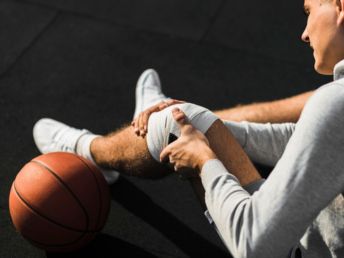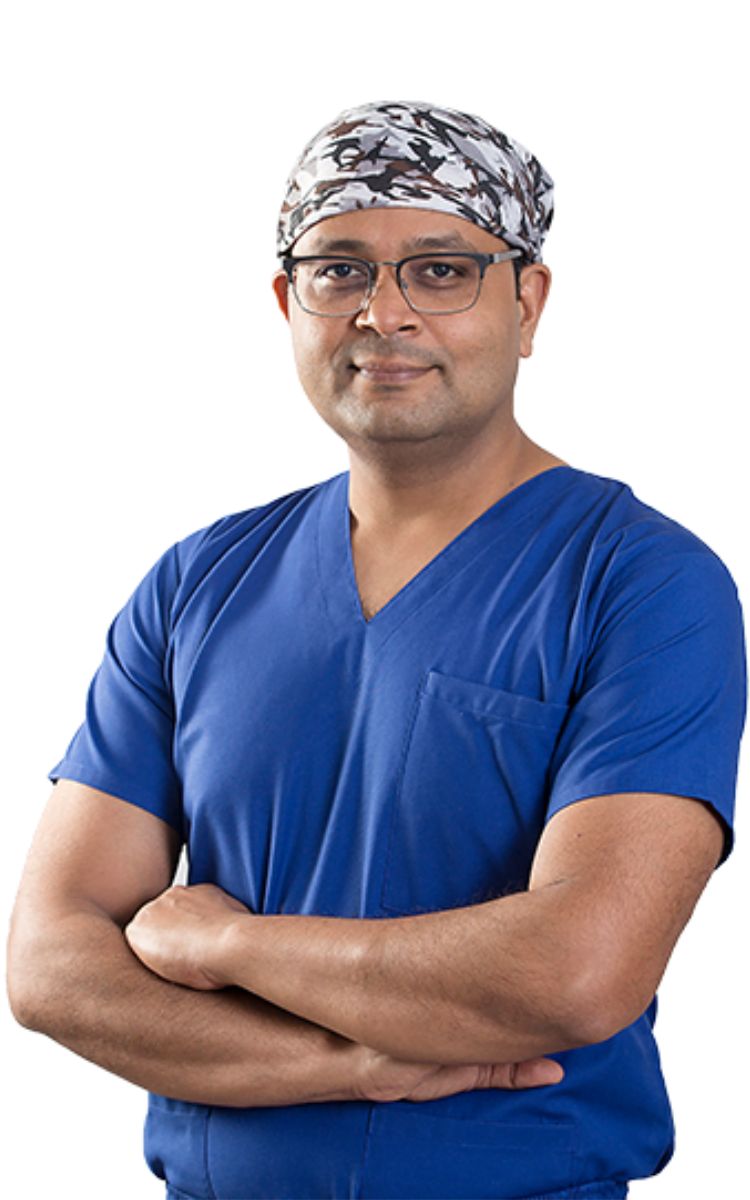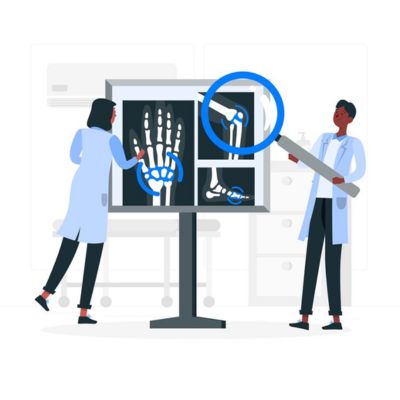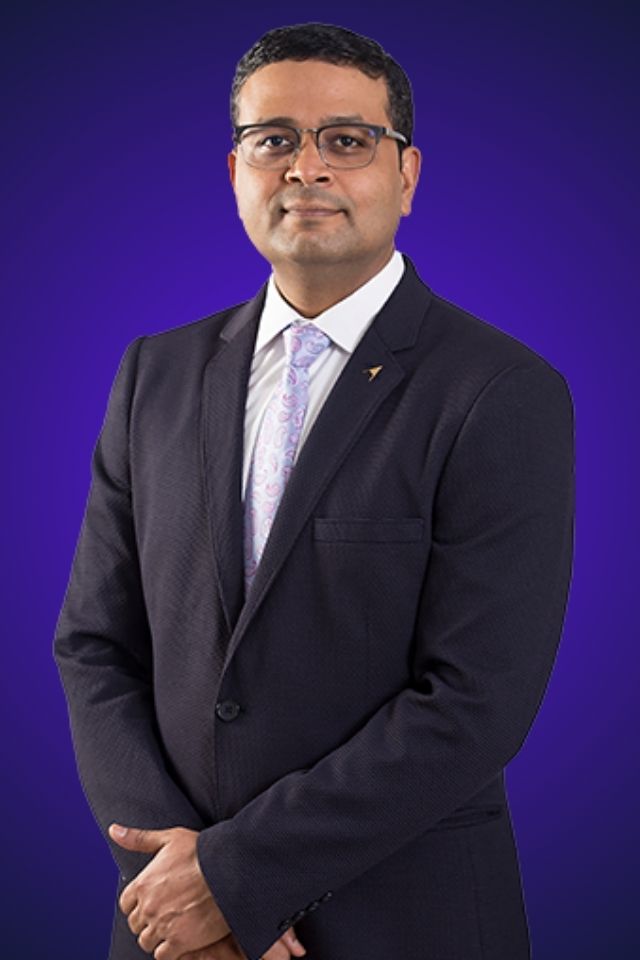Sports Injury Doctor in Noida and Greater Noida
Get the best sports injury doctor in Noida and Greater Noida with Dr. Himanshu Gupta, a renowned orthopedic surgeon.
Having over 15 years of experience and 15,000+ successful surgeries, Dr. Gupta blends advanced techniques with compassionate care to restore your athletic performance and well-being.

Dr Himanshu Gupta
Sports Injury Specialist in Delhi NCR
With a distinguished career spanning over 15 years, Dr. Himanshu Gupta is a gold medalist and an acclaimed orthopedic surgeon specializing in sports injuries.
15+ Years of Experience
Dr. Gupta’s extensive experience in orthopedics, fueled by his passion and dedication, ensures top-tier care and innovative treatment approaches for athletes.
15K+ Successful Surgeries
Accomplishing more than 15,000 surgeries, Dr. Gupta’s expertise in complex orthopedic procedures has redefined sports injury treatments, leading to outstanding patient outcomes.

Best Sports Injury Doctor in Delhi NCR
Dr. Himanshu Gupta stands out as the premier and the best sports injury doctor in Delhi Ncr. Recognized for his exceptional diagnostic skills and personalized treatment plans, he focuses on minimally invasive techniques to accelerate recovery and optimize performance.
Dr. Gupta stays at the forefront of sports medicine by continuously integrating the latest research and innovative practices. His commitment to patient education and preventative strategies sets him apart, making him not just a doctor, but a trusted health advisor for athletes and sports enthusiasts.
Patients under Dr. Gupta’s care receive a holistic treatment experience that addresses both physical recovery and long-term wellbeing.

Our Different Sports Injuries Treatment in Greater Noida
Tennis Elbow, medically known as lateral epicondylitis, is a painful condition caused by overuse of the arm, forearm, and hand muscles. It’s common among athletes and results from repetitive motion, leading to inflammation and micro-tears in the tendons. Effective treatments include rest, physiotherapy, and in severe cases, surgery.
A Rotator Cuff Tear is a common injury affecting the shoulder’s muscles and tendons. It’s often the result of wear and tear or acute injury, causing pain and weakness in the arm. Treatment ranges from physical therapy and pain management to surgical repair for more severe tears.
The labral tear of the shoulder involves damage to the shoulder joint’s cartilage. This sport injury, often seen in athletes engaging in repetitive overhead motions, can cause pain, instability, and decreased range of motion. Treatment varies from conservative methods like physiotherapy to surgical interventions in severe cases.
Shoulder Ligament Muscle Tears involve damage to the shoulder’s stabilizing structures. These injuries can result from acute trauma or overuse, leading to pain, swelling, and limited movement. Treatment typically includes rest, ice, compression, and elevation (RICE), physical therapy, and possibly surgical repair.
Acromioplasty is a surgical procedure to treat impingement syndrome, where the acromion (part of the shoulder blade) rubs against the rotator cuff. The surgery involves reshaping the acromion to relieve pressure on the rotator cuff, reducing pain and improving function.
Acromioclavicular Joint (ACJ) Arthritis affects the joint at the top of the shoulder. It’s typically caused by wear and tear or injury, leading to pain and swelling. Treatment focuses on managing symptoms through medication, physical therapy, and, in severe cases, surgery to repair or replace the joint.
A Labral Tear of the Hip affects the ring of cartilage surrounding the socket of the hip joint. Common in athletes, it can cause pain, stiffness, and a catching sensation in the hip. Treatment ranges from physical therapy and pain management to arthroscopic surgery to repair the tear.
Meniscus Tears involve injury to the knee’s cartilage, common in sports that require twisting movements. Symptoms include pain, swelling, and difficulty moving the knee. Treatments vary from rest and rehabilitation exercises to arthroscopic surgery for more severe or persistent cases.
ACL Surgery is performed to repair or reconstruct the anterior cruciate ligament in the knee, commonly injured in sports. The surgery involves replacing the torn ligament with a graft and is followed by an extensive rehabilitation process to restore strength and stability to the knee.
Get Back in the Game!
Book an appoitment now with the best sports injury doctor in Greater Noida!
Why Choose Dr. Gupta for Sports Injury Treatment in Noida and Greater Noida?
Comprehensive Diagnostic Approach
Using advanced diagnostic tools, we offer precise assessments, ensuring accurate identification of the injury and its severity, which is crucial for an effective treatment plan.
Personalized Treatment Plans
Each patient receives a tailored treatment plan, designed to meet their specific needs and recovery goals, ensuring a more effective and faster return to peak performance.
Advanced Surgical Techniques
Dr. Gupta's expertise in minimally invasive surgery reduces recovery time and enhances outcomes, making him a preferred choice for complex sports injuries.
Multidisciplinary Team
Patients benefit from a collaborative approach involving a team of specialists in physiotherapy, rehabilitation, and sports medicine, ensuring comprehensive care.
Cutting-edge Rehabilitation Facilities
We have world-class rehabilitation facilities, aiding in quicker and more efficient recovery post-treatment, a vital aspect of sports injury management.
Emphasis on Injury Prevention
Beyond sports injury treatment in Greater Noida, the focus is also on injury prevention, providing athletes with guidance and training to minimize future injury risks.
Successful Track Record
Dr. Gupta’s history of successfully treating a wide range of sports injuries in Delhi NCR is a testament to his skill and dedication to patient care.
Patient-Centered Care
Prioritizing patient comfort and care, the clinic ensures a supportive environment, addressing each patient’s concerns and needs throughout their treatment journey.

Best Sports Injury Surgeon in Greater Noida
Dr. Himanshu Gupta stands as the #1 sports injury doctor in Greater Noida. His reputation as the best sports injury orthopedic surgeon is built on a foundation of exceptional surgical precision, patient-centric care, and a relentless commitment to adopting the latest medical advancements.
His expertise is not just in conducting surgeries with utmost precision, but also in ensuring comprehensive post-operative care and rehabilitation. Dr. Gupta’s approach goes beyond mere treatment; he focuses on holistic recovery, enabling athletes to regain their peak performance with minimal downtime.
His dedication to excellence and continuous skill enhancement makes him the first choice for athletes seeking the best surgical care for their sports injuries.
Ready to Bounce Back? Contact Us!
Book an appoitment now with the best sports injury doctor in Greater Noida!
FAQs About Sports Injury Treatment in Greater Noida
What types of sports injuries does Dr. Gupta treat?
Dr. Gupta specializes in a wide range of sports injuries including Tennis Elbow, Rotator Cuff Tears, Labral Tears of the Shoulder and Hip, Meniscus Tears, ACL injuries, and more. His expertise covers both surgical and non-surgical treatments.
How does Dr. Gupta approach sports injury treatment in Greater Noida?
Dr. Gupta adopts a comprehensive approach to sports injury treatment, starting with accurate diagnosis, followed by personalized treatment plans which may include surgery, physiotherapy, and rehabilitation. He emphasizes minimally invasive techniques and patient education for faster recovery and prevention of future injuries.
What can I expect during my first visit for a sports injury consultation?
During your first visit, Dr. Gupta will conduct a thorough assessment of your injury, which may include physical examinations and diagnostic tests. He will discuss your symptoms, activity level, and medical history to understand the issue comprehensively before suggesting a treatment plan.
How long is the recovery process after sports injury surgery?
Recovery time varies depending on the type of injury and surgery. Dr. Gupta and his team provide personalized post-operative care plans, including rehabilitation and physiotherapy, to ensure the fastest and most effective recovery.
Are there any non-surgical treatment options available for sports injuries?
Yes, many sports injuries can be effectively treated with non-surgical methods such as physical therapy, targeted exercises, medication, and lifestyle modifications. Dr. Gupta evaluates each case to recommend the best course of action.
How does Dr. Gupta ensure a holistic recovery from sports injuries?
Dr. Gupta’s approach to recovery extends beyond physical healing. He focuses on overall wellbeing, including strength and mobility restoration, injury prevention strategies, and advice on returning safely to sports activities.
Does Dr. Gupta use any advanced technology in sports injury treatment?
Yes, Dr. Gupta utilizes the latest in medical technology and techniques for diagnosing and treating sports injuries. This includes advanced imaging for accurate diagnosis and minimally invasive surgical techniques for better outcomes.
Can I receive guidance on preventing future sports injuries?
Absolutely. Dr. Gupta and his team provide comprehensive advice on injury prevention, including strength training, proper techniques, and lifestyle adjustments to help athletes minimize the risk of future injuries.
What is the process for scheduling an appointment with Dr. Gupta?
Appointments with Dr. Gupta can be scheduled by contacting us directly via phone or email. We also offer an online booking option through our website for your convenience.
Is there support for post-surgical rehabilitation at the clinic?
Absolutely. We are equipped with advanced rehabilitation facilities, and we offer customized rehabilitation programs post-surgery to aid in your recovery and ensure you return to your optimal physical condition.
Will my sports injury treatment be covered by insurance?
Insurance coverage varies depending on your policy. We recommend contacting your insurance provider to confirm your coverage details. Our clinic staff can assist with any necessary documentation for insurance claims.
How often will I need to visit the clinic during my treatment?
The frequency of visits depends on the nature and severity of your injury, as well as the treatment plan prescribed by Dr. Gupta. Regular follow-ups are important for monitoring progress and making any necessary adjustments to the treatment.
Can I continue my sports activities during treatment?
This depends on the type of injury and the stage of treatment. Dr. Gupta advises on a case-by-case basis, focusing on safe and gradual return to sports while minimizing the risk of re-injury.
Are there any lifestyle changes I can make to complement my sports injury treatment?
Yes, making certain lifestyle changes can significantly aid in your recovery. These may include dietary modifications, adopting a suitable exercise routine, and making ergonomic adjustments to your daily activities.
What are sports injuries?
Sports injuries are physical damages that occur during any sports activity, exercise, or fitness training. They can range from acute injuries like sprains and fractures to chronic issues such as tendonitis or stress fractures.
Who might get a sports injury?
Anyone engaging in physical activities, from professional athletes to recreational sports enthusiasts, can sustain a sports injury. The risk varies based on the sport, intensity of activity, skill level, and individual physical condition.
What are the most common parts of the body injured in sports?
Commonly injured body parts in sports include the knees, shoulders, ankles, elbows, and spine. These areas are more susceptible due to the stresses and impacts they endure during various sports activities.
What are the most common sports injuries?
The most common sports injuries include sprains and strains, knee injuries, swollen muscles, Achilles tendon injuries, shin pain, fractures, and dislocations.
What are the symptoms of a sports injury?
Symptoms of sports injuries can include pain, swelling, stiffness, reduced range of motion, weakness, and instability in the affected area. In some cases, you may hear a popping or snapping sound at the time of injury.
How is a sports injury diagnosed?
Diagnosis involves a physical examination and medical history review, along with diagnostic tests like X-rays, MRIs, CT scans, or ultrasounds to assess the extent of the injury.
How is a sports injury treated?
Treatment varies depending on the injury type and severity but may include rest, ice, compression, elevation (RICE), physical therapy, medications, and in some cases, surgery.
How can I reduce my risk of sports injuries?
To reduce the risk of sports injuries, practice proper warm-up and cool-down routines, use appropriate equipment and protective gear, maintain good physical condition, and avoid overtraining.
How do I take care of myself after a sports injury?
Post-injury care includes following the prescribed treatment plan, participating in rehabilitation or physical therapy as recommended, and gradually returning to sports activities under professional guidance.
When should I seek medical attention for a sports injury?
Seek medical attention if you experience severe pain, swelling, numbness, instability in the injured area, or if the symptoms do not improve with home care.
What can I ask my doctor about my sports injury?
You can ask about the specific nature and severity of your injury, the expected recovery timeline, treatment options and their potential side effects, and recommendations for preventing future injuries.
Other Ortho Surgeries
Other Services
Sports Injury Treatment
- ACL Surgery in Greater Noida
- Meniscus Tears Treatment in Greater Noida
- Laberal Hip Tear Treatment in Greater Noida
- AC Joint Arthritis Treatment in Greater Noida
- Acromioplasty Surgery in Greater Noida
- Shouder Ligament Tear Treatment in Greater Noida
- Shoulder Dislocation Treatment in Greater Noida
- Rotator Cuff Injury Treatment in Greater Noida
- Tennis Elbow Treatment in Greater Noida
